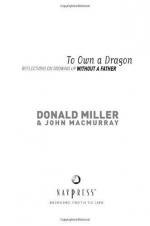
|
| Name: _________________________ | Period: ___________________ |
This test consists of 5 short answer questions, 10 short essay questions, and 1 (of 3) essay topics.
Short Answer Questions
1. Which of the following men taught chess to boys to teach them decision-making skills?
2. Miller believes a famous person he saw interviewed is example of _____________?
3. Where does Miller find a job when he moves to Oregon?
4. In Chapter 9, what point for boys raised without fathers does Miller reinforce?
5. What happens to Miller in the high school class he has to get permission to register for?
Short Essay Questions
1. Chapter 11 is short and Miller learns some very valuable life lessons. What is different about this chapter?
2. In Chapter 9, Girls, Miller asserts that growing up without a father has left him poorly prepared to be in a relationship. Why is this surprising?
3. As an adult, Miller often found himself having difficulty fitting in with the men in his church and life, particularly in his Bible study class. What did he think the problem was?
4. What event changes Miller's attitude about his ability to be a good student in high school?
5. In Chapter 8, Miller states that young men without fathers as role models are more likely to experience negative consequences in life. What evidence does Miller provide to support this statement?
6. Miller stresses the importance of making wise decisions in Chapter 8. He believes young men without fathers need to be intentional about learning to make decisions. How does he recommend they do this and why?
7. Miller learns the secret to a successful love relationship from a married friend. According this married friend, what is this secret and what does it look like?
8. In Chapter 10, Miller makes a presentation to a fraternity on the topic of sex. What do these men suggest the consequences are for young men who decide to "live a moral high ground"?
9. In Chapter 11, the author focuses on the importance of reading as a significant skill for success in life. What does he say?
10. In Chapter 12, work is defined as honorable and spiritual. What does this mean?
Essay Topics
Write an essay for ONE of the following topics:
Essay Topic 1
In Chapter 11, the author addresses integrity. He does not define integrity. Instead, he gives examples of integrity and provides stories about how he learned about integrity. Define integrity as Miller uses it in the context of this book. Compare and contrast Miller's concept of integrity with your understanding of integrity. How are they similar? Different? What is missing, if anything, in Miller's definition? What would you add or change about his definition? Why or Why not?
Essay Topic 2
Chapters 9 & 10 are short but both contain very important information about sex and love. What are the primary points made about sex and love and how are these two issues connected to Miller's concern about being raised without a father?
Essay Topic 3
In Chapter 11, work ethic is examined. However, the author does not provide a definition of work ethic. Instead, he describes several work ethics characteristics.
a. Identify the characteristics that Miller indicates are parts of a work ethics. How did apply them to himself? Do you agree or not with the characteristics that he identified? What characteristics of a good work ethic did he not address?
b. Miller connects his understanding of work ethics of humans as a spiritual responsibility. How does he do this? Do you agree or not with his explanation of work ethics as spiritual responsibility?
c. In addition, there are many other critical characteristics of a good work ethic. What characteristics did he not address that he should address? Do these additional characteristics contribute to his comparison of work ethics to a faith based explanation?
|
This section contains 1,439 words (approx. 5 pages at 300 words per page) |

|




